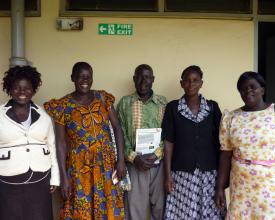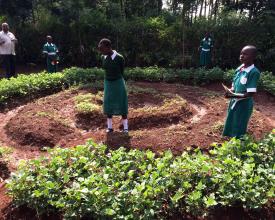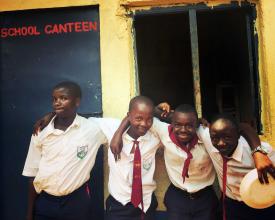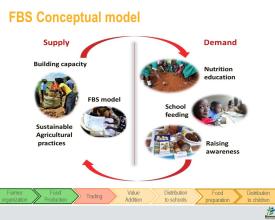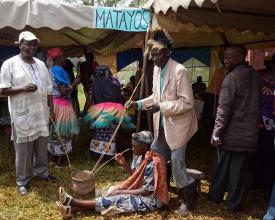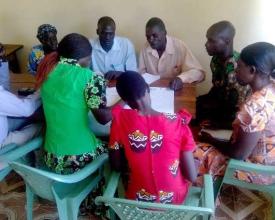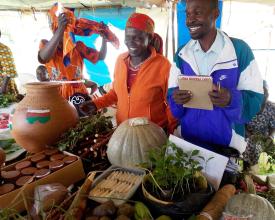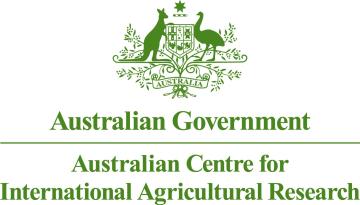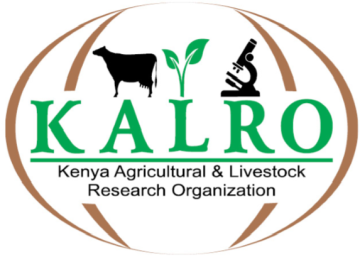
La révolution alimentaire à l'école au Kenya
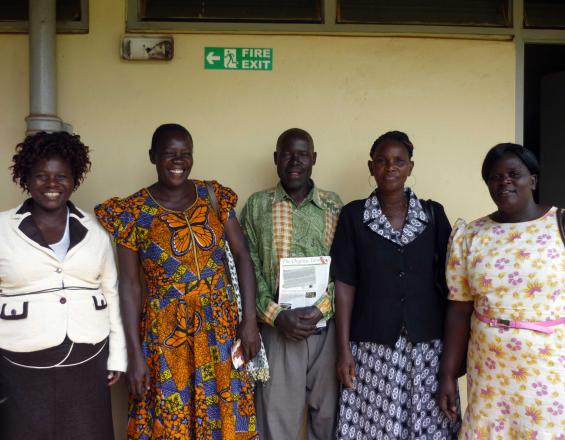
Autrefois perçus comme des "aliments pour les pauvres", les légumes feuilles africains (ALV) et d'autres cultures oubliées font leur retour dans le comté de Busia, au Kenya, grâce à un projet pilote soutenu par l'ACIAR et le FEM et à une plateforme multisectorielle participative qui rassemble des organisations d'agriculteurs, des organisations non gouvernementales et des agences gouvernementales nationales et internationales. Le projet contribue à raviver l'intérêt pour les ALV nutritives en renforçant la capacité de groupes d'agriculteurs entrepreneurs à produire, utiliser et répondre de manière durable à la demande des marchés institutionnels pour ces cultures (par exemple, l'alimentation scolaire et les cliniques de santé). Dans le même temps, des activités éducatives sont menées afin d'accroître l'appréciation et l'utilisation de la biodiversité locale pour améliorer la diversité alimentaire, la nutrition et la résilience environnementale, mais aussi pour apporter un soutien durable et à long terme aux enfants, aux familles et aux communautés et leur donner les moyens d'agir.
Contexte
Défis à relever
Les taux de pauvreté à Busia varient entre 63% et 74%. Deux citoyens sur trois ne sont pas en mesure de satisfaire leurs besoins alimentaires de base et 26,6 % des enfants de moins de cinq ans souffrent d'un retard de croissance, 11 % d'une insuffisance pondérale et 4 % d'une maigreur due à la malnutrition. Des études ont montré que les agriculteurs de Busia ne connaissent pas les pratiques agricoles améliorées et les solutions techniques parce que le personnel de vulgarisation est trop peu nombreux et manque de moyens de transport et de ressources pour atteindre le grand nombre de petits agriculteurs. La faiblesse des investissements et du soutien du gouvernement aux agriculteurs, le manque de semences de qualité, l'accès limité aux marchés et au financement, ainsi que la méconnaissance de la valeur ajoutée, de la manipulation post-récolte, de la sécurité alimentaire et des pratiques d'hygiène exacerbent ces problèmes. En outre, l'accent mis par le développement agricole sur la production de plus grandes quantités de quelques aliments de base riches en énergie a conduit à négliger un grand nombre d'espèces locales hautement nutritives qui disparaissent rapidement de l'environnement et du régime alimentaire des populations.
Emplacement
Traiter
Résumé du processus
Les informations existantes sur la valeur nutritionnelle des légumes indigènes et les nouvelles données générées par le projet ont été utilisées pour sensibiliser à l'importance d'incorporer ces espèces dans un régime alimentaire varié et équilibré, tant du côté de l'offre que de la demande de la chaîne de valeur. Du côté de l'offre de la chaîne de valeur alimentaire, le modèle vise à renforcer la capacité des petits exploitants agricoles à répondre à la demande croissante du marché pour des cultures nutritives en fournissant une formation sur la production alimentaire, la gestion d'entreprise et l'ajout de valeur par le biais du modèle de l'école d'entreprise agricole. Simultanément, du côté de la demande, des activités de sensibilisation telles que la foire alimentaire de Busia ont contribué à susciter l'intérêt pour les cultures locales, ce qui a permis à un certain nombre d'écoles, de cliniques et de centres de développement de la petite enfance de les introduire dans leurs programmes de repas institutionnels.
Blocs de construction
Développement d'une école de commerce agricole (FBS)
Il sera essentiel de veiller à ce que les agriculteurs soient en mesure de fournir de manière compétitive des denrées alimentaires à tout futur programme de repas scolaires produits localement, ou à tout autre marché institutionnel, afin d'améliorer les moyens de subsistance et de générer une croissance économique et sanitaire à grande échelle. Actuellement, la garantie d'un approvisionnement régulier en légumes frais reste un défi et les écoles ont l'habitude de s'approvisionner auprès d'un ou plusieurs grands négociants en suivant les directives gouvernementales en matière de contrats et de procédures d'appel d'offres. Les formations dispensées par la Farmer Business School sur les pratiques agricoles durables et la fourniture de semences certifiées ont aidé les agriculteurs à augmenter leurs niveaux de production de légumes indigènes, tandis que les conseils sur l'analyse de la marge brute et les processus d'appel d'offres ont amélioré les compétences des agriculteurs en matière de négociation de contrats et de détermination d'un prix équitable pour leurs produits. Avant la formation, un nombre limité d'agriculteurs avaient participé à des formations sur le marché et la valeur ajoutée, s'attendant à ce que des tiers entreprennent des recherches de marché en leur nom. Après la formation, les agriculteurs étaient plus confiants dans la recherche de leurs propres marchés, en particulier après avoir appris que les marchés institutionnels étaient ouverts à l'achat de légumes indigènes pour accroître la diversité alimentaire de leurs bénéficiaires et améliorer la nutrition.
Facteurs favorables
Un atelier consultatif organisé au début du projet a réuni des groupes d'agriculteurs, des écoles et des administrateurs locaux afin d'identifier les principales contraintes qui entravent la commercialisation des légumes feuilles africains. L'atelier a réuni à la même table l'offre (agriculteurs) et la demande (écoles) de la chaîne de valeur pour discuter de l'approvisionnement futur des marchés institutionnels en légumes feuilles africains, tandis qu'un environnement favorable a été créé pour les administrateurs locaux qui, avant le projet, n'avaient que très peu d'expérience de collaboration.
Leçon apprise
Du côté de la production, susciter l'intérêt des agriculteurs peut s'avérer un défi car les contraintes de temps sont souvent un facteur limitant pour les agricultrices qui ont d'autres tâches et responsabilités domestiques. Idéalement, il faudrait consacrer plus de temps à la mise en place du FBS pour qu'il fonctionne efficacement. En outre, il convient de mettre davantage l'accent sur le renforcement des capacités en matière de valeur ajoutée afin de permettre aux agriculteurs de maintenir leur capacité de production tout au long de l'année. Le processus de mise en relation des agriculteurs avec les marchés institutionnels peut également être lent, principalement en raison de problèmes de nature logistique (transport, autres engagements professionnels des parties prenantes) et de difficultés à obtenir le soutien des acteurs du comté pour le projet. Des visites fréquentes à l'école sont nécessaires pour réussir à impliquer l'administration de l'école et il faut veiller à ce que la communauté environnante, le personnel de l'école et les parents soient au courant de tout accord d'approvisionnement local. Des soupçons de gains personnels peuvent surgir lorsqu'il n'y a pas de compréhension commune d'un projet ou de l'appropriation par la communauté.
Organiser une foire alimentaire traditionnelle
Pendant la durée du projet, deux foires alimentaires traditionnelles ont été organisées au centre de formation agricole de Busia. Ces foires ont permis d'accroître la participation de la communauté à la gestion de la biodiversité en changeant l'état d'esprit et l'attitude des gens à l'égard des aliments locaux. Au cours de ces foires, les agriculteurs ont collecté des parties de plantes, des graines, des échantillons de fruits et des produits alimentaires traditionnels et se sont affrontés pour les présenter de la manière la plus complète. Ce fut également l'occasion pour les agriculteurs de partager des informations relatives à la biodiversité et aux connaissances traditionnelles associées, ainsi que du matériel de plantation et des semences, tout en permettant à l'équipe de recherche de localiser de nouveaux gardiens de la biodiversité. On estime que les foires ont contribué à encourager les consommateurs, les écoles, les jeunes, les décideurs politiques et les communautés agricoles à continuer d'utiliser les cultures et les variétés locales, contribuant ainsi à leur conservation.
Facteurs favorables
Il est nécessaire d'identifier des champions au sein de la communauté et au niveau politique pour s'assurer que le message est transmis et soutenu de manière adéquate. L'organisation d'une foire alimentaire traditionnelle requiert également des compétences organisationnelles importantes, et il convient donc de réfléchir à la répartition des rôles et des responsabilités entre les différentes parties de l'organisation.
Leçon apprise
- Il convient de rechercher des fonds suffisants, soit par le biais d'un financement direct, soit en nature (aide à l'organisation de la foire), car les manifestations peuvent être coûteuses.
- Publicité - il convient de consacrer suffisamment de temps à une large publicité avant l'événement. Utilisez tous les moyens auxquels vous pouvez penser pour vous assurer que le message est diffusé. Par exemple, les groupes religieux, la radio, les sms, Whattsapp, les médias sociaux, le courrier électronique.
- Laissez de la place à la concurrence. Lors de l'événement de Busia, sept groupes d'agriculteurs se sont affrontés pour la meilleure présentation et la meilleure variété d'aliments traditionnels, mais ils ont également été jugés sur la base de l'hygiène et de la valeur ajoutée. Les concours de cuisine sont également très appréciés et pourraient être un bon moyen d'impliquer le public.
Impacts
SINGI promeut des pratiques agricoles durables pour créer des jardins familiaux utilisant des légumes feuilles africains (ALV) et d'autres cultures traditionnelles. Les ALV sont des espèces adventices, semi-cultivées, adaptées à l'environnement local, plus résistantes aux parasites et aux maladies et nécessitant très peu de gestion, d'engrais et de pesticides. Elles offrent également un accès facile et abordable à des nutriments clés. SINGI a travaillé avec des partenaires pour développer et tester un modèle d'approvisionnement alimentaire viable basé sur les ALV afin de promouvoir la conservation de la biodiversité alimentaire locale tout en améliorant les moyens de subsistance des agriculteurs et en promouvant des repas scolaires plus sains. Depuis le lancement de l'approche dans une école pilote à la mi-2016 accueillant 400 élèves, 14 contrats ont été conclus et le réseau "de la ferme à l'école" fournit désormais des repas scolaires sains à environ 5 500 élèves. Les quantités fournies varient entre 10 kg par semaine et six fois plus, tandis que le coût convenu par kilo varie entre 0,30 et 0,50 USD en fonction de la saison. L'établissement de liens entre les groupes d'agriculteurs et les écoles et les dispensaires a créé des opportunités d'emploi pour les agriculteurs qui disposent désormais d'un marché stable pour leurs produits, tandis que les écoles considèrent que les liens avec les agriculteurs locaux font partie de la responsabilité sociale et environnementale de l'entreprise.
Bénéficiaires
Les bénéficiaires cibles sont les communautés rurales et les petits exploitants agricoles vivant à Busia, qui bénéficieront d'une augmentation des revenus des ménages et d'une amélioration de la diversité alimentaire pour tous les groupes d'âge, ce qui aura des répercussions positives sur la croissance économique et le bien-être humain.
Objectifs de développement durable
Histoire
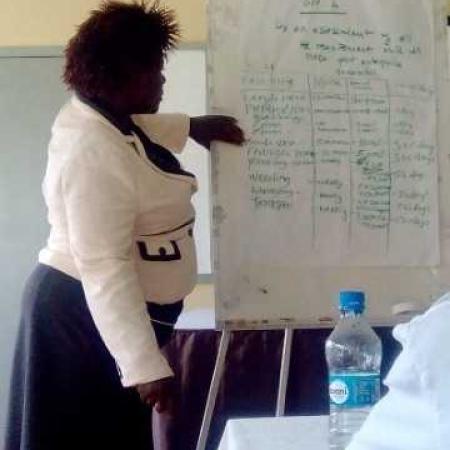
À la mort de son mari, le monde de Joyce Momanyi s'est soudainement écroulé. Femme au foyer et agricultrice du village de Nang'eni à Nambale, dans le comté de Busia, comment allait-elle gagner sa vie, envoyer ses enfants à l'école et utiliser le terrain de cinq acres que son mari lui avait légué pour nourrir sa famille ? Comme la plupart des habitants de son village, elle a planté du maïs. Le maïs a bien marché, mais lorsqu'elle est allée le vendre sur le marché local voisin, celui-ci était inondé de céréales provenant d'autres petits exploitants, les prix étaient bas et ses bénéfices marginaux. C'est alors qu'elle a décidé de tenter sa chance dans la production de légumes feuilles africains (ALV), une décision qui, selon elle, a complètement transformé sa vie. Joyce a lentement commencé à consacrer des portions de terre de plus en plus importantes à la production d'ALV. Ce qui l'a séduite, c'est le fait que, par rapport au maïs, les légumes indigènes poussent plus vite et nécessitent moins d'intrants et d'eau. Au bout de trois à quatre semaines, les légumes étaient prêts à être récoltés et, à sa grande surprise, les acheteurs faisaient déjà la queue à la porte de sa ferme. "Mes voisins se lancent encore dans la production de maïs parce qu'ils ne connaissent pas les avantages de la production d'ALV. Il ne faut que 3 semaines à 1 mois pour que les ALV soient prêtes pour le marché, alors qu'il faut 5 mois pour que le maïs arrive à maturité". Plus elle développait son exploitation, plus le nombre de ses clients augmentait. Pour sortir les autres de la pauvreté, elle a formé le groupe de femmes Great Sisters - un groupe de jeunes veuves et de mères âgées - qui ont suivi l'école de commerce pour agriculteurs organisée par le projet. Au cours de la formation au marché, elle a contacté l'école secondaire d'Esibembe et a pu obtenir un contrat pour son groupe. Pour réduire les achats de semences, Joyce s'est également lancée dans la production de semences. Elle dit qu'elle vendra des semences supplémentaires aux membres de son groupe. "Comment une simple agricultrice comme moi aurait-elle pu savoir qu'il était possible de faire d'une école son marché ? Je suis très reconnaissante". Joyce a également réussi à payer les frais de scolarité de ses enfants. Grâce à la production d'ALV, elle a amélioré l'économie de son ménage et est certaine que son mari la regarde fièrement d'en haut.

